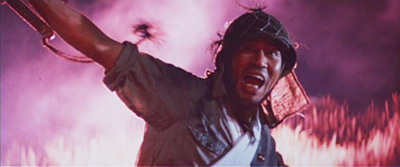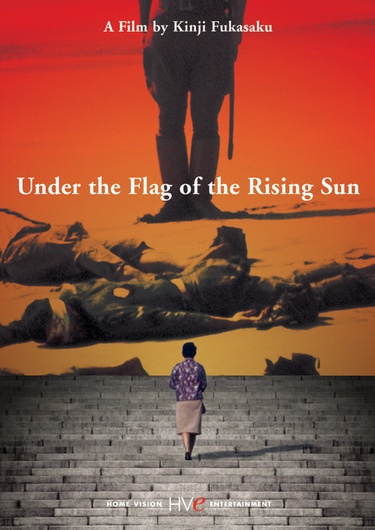 It isn't often that I watch a film and then immediately watch it again, particularly one as emotionally wrenching as Under the Flag of the Rising Sun. OK, so the second time I wanted to hear Linda Hoaglund's excellent commentary. Nevertheless the story itself is packed with twists and reveals that provide a very different, yet equally compelling, experience the second time around.
It isn't often that I watch a film and then immediately watch it again, particularly one as emotionally wrenching as Under the Flag of the Rising Sun. OK, so the second time I wanted to hear Linda Hoaglund's excellent commentary. Nevertheless the story itself is packed with twists and reveals that provide a very different, yet equally compelling, experience the second time around.Made by Kinji Fukasaku in 1972, Under the Flag of the Rising Sun ranks with Masaki Kobayashi's The Human Condition (1959-61) and Kon Ichikawa's Fires on the Plain (1959) as one of the finest Japanese anti-war films ever made. If your awareness of Fukasaku's films stops at Battle Royale (2000) or his groundbreaking Jingi Naki Tatakai (Battles Without Honor and Humanity, 1973-4) yakuza series, be prepared for a revelation: This director, known primarily in the West as a purveyor of innovative screen violence, was in fact passionately anti-war. Along with Kobayashi and Kihachi Okamoto, Fukasaku got a firsthand look at the horrors of war as a young man, picking up the body parts of his school friends after an air raid at the age of 15. Like Okamoto, these early experiences informed Fukasaku's use of violent imagery in his films, particularly in the case of Under the Flag of the Rising Sun.
The story concerns Sakie Togashi (Sachiko Hidari), a war widow who, 26 years after the conflict, is still uncertain as to the nature of her husband's death. Official records were either burned or hastily prepared, and it falls upon her to investigate the matter, seeking out the four surviving members of her husband's unit. Thus ensues a series of confounding, Rashomon-like flashbacks, each told from the viewpoint of one man, colored by his own personal agenda, and all utterly contradictory. Sgt. Togashi (Tesuro Tamba) was either a valiant leader who died gloriously in battle, a ghoulish human flesh peddler, or something in between. Gradually, through his wife's efforts, a clear picture finally emerges, but don't expect a happy ending.
 The film is unflinching in it's depictions of starvation, disease, insanity, cannibalism, inter-rank brutality, summary executions, dismemberment and the like. As it happens, the Japanese high command had a tendency to disregard the fate of soldiers stranded in places like New Guinea, and the gruesome realities of survival in such a situation are laid bare. It's not an easy film to watch, but then the truth is never easy, particularly the truth about war.
The film is unflinching in it's depictions of starvation, disease, insanity, cannibalism, inter-rank brutality, summary executions, dismemberment and the like. As it happens, the Japanese high command had a tendency to disregard the fate of soldiers stranded in places like New Guinea, and the gruesome realities of survival in such a situation are laid bare. It's not an easy film to watch, but then the truth is never easy, particularly the truth about war.Although a contract director for Toei for most of his career, Fukasaku made Under the Flag of the Rising Sun independently, having secured the book rights with his own money. Shooting guerrilla style, using found locations and hand-held cameras, Fukasaku was simultaneously developing the gritty style that would make his jitsuroku yakuza saga Jingi Naki Tatakai so uniquely visceral. No, there's no Bunta Sugawara in the platoon, but you can't miss a strangely mute Isao Natsuyagi alongside Tamba.
As I mentioned earlier, the HVE disk of Under the Flag of the Rising Sun features an engaging and informative commentary track courtesy of the translator/subtitler, Linda Hoaglund. I first became aware of Ms. Hoaglund while writing Stray Dogs & Lone Wolves, quoting from an interview she conducted with Masaki Kobayashi. She's subtitled scores of Japanese films, including plenty by Kurosawa (both Akira and Kiyoshi), Kon Ichikawa, Hiyao Miyazaki, Sabu, Kore-eda and on and on, as well as writing articles, conducting interviews and producing films.
Anyhow, I urge everyone to see Under the Flag of the Rising Sun. It's one of those films that brings home the atrocity of war, something people seem to need constant reminding of; only in this way will we be able to avoid it in the future. Oh, and it totally makes up for Message From Space and The Green Slime!


4 comments:
A superb Fukasaku film. So terribly underrated and underseen.
Perhaps, through our efforts, a few more people will see it!
I was looking for a Japanese movie about the war for a paper, and this post made me watch this amazing film, so, yes, you are making it more known by writing about it! Thank you!
Glad to hear it. Thanks, Amy!
Post a Comment